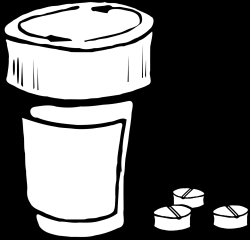New Triptan Study (and is it really useful?)
Triptans – medications that were specifically designed to fight migraine pain – come in a number of varieties. So, which ones are the most effective? A new study attempts to answer that question.

The study, published in the European Journal of Clinical Pharmacology, compared various triptan medications. Probably the most well known is sumatriptan, partly because it was the first one to come out years ago. But as we’re discussed in the past, sumatriptan doesn’t work for everyone. Some people who have not found it helpful at all have had great success with other triptans.
For more of an introduction to triptans, see 10 Triptan Facts You Need to Know Now.
So who was the “winner”? Surprisingly, it was eletriptan, a 40mg dose. The “loser” was naratriptan. Both of these were oral doses.
The difference between the two? Well, about three times more people were pain free at two hours with eletriptan than with naratriptan, so all the other triptans would fall between the two.
So – oral dose, you say. What about in injection? Or those nasal sprays? Aren’t they better?
Actually, they compared nasal sprays, oral, and subcutaneous (injections). Of course, most of the variety out there is with sumatriptan, so that’s where most of the information comes from. In short, the injections had the advantage of being quite a bit faster, but oral and nasal spray were about the same for effectiveness.
So just how useful is this information? Should everyone just run out to buy eletriptan? In oral form?
Well, there are some serious limitations with this study. As I suggested before, there’s a lot more information (and variety) for sumatriptan.
But perhaps even more importantly, there are some important reasons why one triptan may work for you and another may not. You may be taking other medications that could interact with a certain triptan. One may work better for women, or older patients.
So yes, maybe doctors and patients should pay a little more attention to eletriptan as a good option. Maybe you should even try it first (before other triptans, that is). But talk to your doctor, because she may have suggestions for you, far beyond “this happens to work better for most patients in clinical trials”. Everyone is different, with a different medical history and a different biological make up.
So how useful is this study? It’s worth raising an eyebrow and reconsidering what triptans we prioritize, as we look at it along with other trials. It also says good things about oral medications, and injections. But again, there are lots of other studies that say good things about nasal sprays – it depends on the person.
You can read the abstract here: Efficacy of triptans for the treatment of acute migraines: a quantitative comparison based on the dose-effect and time-course characteristics
